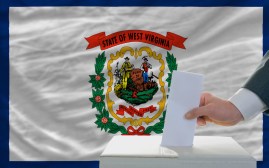Bill allowing ‘ballot selfies’ vetoed by Oklahoma governor

Oklahoma will not be the latest state to allow voters to take selfies with their ballots, after Gov. Mary Fallin vetoed a bill this week that would’ve legalized the seemingly innocuous, but controversial practice.
Fallin, a Republican, declined to sign a bill that would’ve allowed Oklahomans to take photos of their marked ballots, from either an absentee form or a voting booth, and share the images on social media. So-called “ballot selfies” have become increasingly popular over the past several election cycles, but ballot-security experts and elections officials in some states have become increasingly wary of the images’ potential to be abused.
“I am concerned how this will potentially open up the voting process for voter intimidation and propaganda electioneering,” Fallin wrote in her letter to Oklahoma legislators explaining her veto, the Tulsa World reported.
States are figuring out how to bolster the security of their voting systems, including spending as much as $380 million in new federal grants for election cybersecurity. But for years now, states have differed wildly on how much they’re willing to let individual voters share their choices with their online acquaintances.
Only eight states explicitly allow voters to take photos of their marked ballots, according to a 2016 report by HuffPost. But in places where the practice is technically or legally prohibited, the penalties for people caught taking ballot selfies range from a verbal warning from a poll worker (the punishment in Washington, D.C.) to fines or even jail time in other localities. Pennsylvania law, for instance, threatens anyone who allows “his ballot or the face of the voting machine voted by him to be seen by any person with apparent intention of letting it be known how he is about to vote” with a fine of up to $1,000 or as long as one year behind bars.
Laws aimed at stopping photos of completed ballots don’t always hold up in court. A 2014 New Hampshire law that led to investigations of three Granite State voters — one of whom wrote in his dog in a U.S. Senate election — resulted in a lawsuit from the American Civil Liberties Union, which challenged the prohibition on First Amendment grounds. A federal judge ruled the law was unconstitutional in 2015; New Hampshire’s appeal was unsuccessful, and the U.S. Supreme Court declined to hear the case any further.
The bill Fallin signed would’ve continued Oklahoma’s ban on voters sharing their preferences while inside polling places, but it would’ve lifted any prohibitions on taking photos of those choices to be shared later. “A voter may take a digital image or photograph of his or her marked ballot and distribute or share the image via social media or by any other means if performed voluntarily and in compliance with state and federal law,” the bill reads.
But the reasons Fallin cited in her veto letter echo concerns previously voiced by election-law experts who say social-media streams full of filled-out ballots could be used to intimidate people who haven’t voted yet. Rick Hasen, a professor at the University of California, Irvine and frequent commentator on voter behavior, raised such a possibility in 2015 after a judge first struck down the New Hampshire ban.
“…[T]he judge made a huge mistake because without the ballot-selfie ban, we could see the reemergence of the buying and selling of votes — and even potential coercion from employers, union bosses and others,” Hasen wrote in a Reuters column.
Hasen argued in that column, and has continued since on his website, that ballot selfies could become a throwback to the era before people voted using secret, government-printed ballots. Until the 1890s, most ballots in U.S. elections were printed by political parties and often delivered to voters in partisan newspapers, making it easier for party bosses to see who was voting for whom and potentially sway voters either with monetary inducement or other forms of persuasion.
Court rulings on ballot-selfie bans are inconsistent, though. While there’s nothing stopping a voter from telling others — either in person or on the internet — how he or she voted, a federal judge last year upheld a New York ban, writing that photographs of filled-out ballots can be used in voter-intimidation attempts, to say nothing of the fact that a person stopping to take pictures inside the ballot box causes fellow voters to wait longer.
Fallin’s veto is unlikely to survive. The ballot-selfie bill sailed through both houses of Oklahoma’s legislature with minimal opposition, making the two-thirds vote needed to override Fallin more likely than not. Hasen, for his part, expects the larger philosophical debate to continue.
“I continue to believe that states have a good basis to bar ballot selfies to prevent vote buying and voter intimidation,” he tells StateScoop in an email. “Given how people love their selfies, I don’t expect this dispute to go away.”






